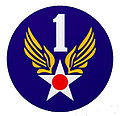Bradley International Airport
| Bradley International Airport | |||
|---|---|---|---|
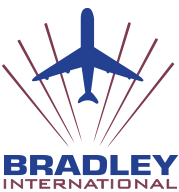 |
|||
IATA: BDL – ICAO: KBDL – FAA LID: BDL
 BDL
|
|||
| Summary | |||
| Airport type | Public | ||
| Owner | Connecticut Department of Transportation (ConnDOT) | ||
| Serves | Hartford, Connecticut & Springfield, Massachusetts | ||
| Location | Windsor Locks, Connecticut / Hartford County Connecticut | ||
| Hub for | UPS Airlines | ||
| Elevation AMSL | 173 ft / 53 m | ||
| Website | |||
| Runways | |||
| Direction | Length | Surface | |
| ft | m | ||
| 6/24 | 9,510 | 2,899 | Asphalt |
| 15/33 | 6,847 | 2,087 | Asphalt |
| 1/19 | 4,268 | 1,301 | Asphalt |
| Statistics (Total Passengers) | |||
| 2009 | 5,460,480 | ||
| 2008 | 6,058,398 | ||
| 2007 | 6,519,181 | ||
| 2006 | 6,907,042 | ||
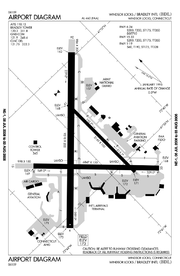
Bradley International Airport (IATA: BDL, ICAO: KBDL, FAA LID: BDL) is a public airport located in Windsor Locks on the border with East Granby and Suffield, in Hartford County, Connecticut, United States. It is owned by the State of Connecticut.[1]
The airport is situated in the towns of Windsor Locks, Suffield and East Granby, about halfway between Hartford and Springfield. It is Connecticut's busiest commercial airport with 350 daily operations, and the second-busiest airport in New England after Boston's Logan International Airport.[2] Delta Air Lines is currently the largest carrier at Bradley International Airport with 46 daily flights and 61 daily when all seasonal flights are operating to a total of 15 nonstop destinations. They have restarted daily service to Fort Myers, Florida and Saturday service to Cancun, Mexico in 2009, as well as the introduction of weekly service to Las Vegas and daily service to Washington-Reagan and Raleigh/Durham in 2010. The airline also carries over 1 million passengers a year, or 1/5 of all passengers traveling from Bradley International Airport.[3] Southwest Airlines is the second largest carrier at Bradley International Airport with 22 daily departures to 8 nonstop destinations. This comes after the announcement that the airline is adding daily service to Fort Lauderdale. Delta offers service to five Florida destinations.
In 2008, Bradley was ranked the 55th busiest airport in the United States by number of passengers emplaned.[4] Bradley is branded as the "Gateway to New England" and is also home to the New England Air Museum.
Contents |
History
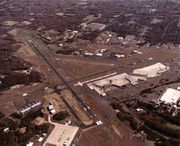
World War II
Bradley has its origins in the 1940 acquisition of 1,700 acres (690 ha) of land in Windsor Locks by the State of Connecticut. In 1941, this land was turned over to the U. S. Army, as the country began its preparations for the impending war.[5]
Less than a year after the Army assumed control, the field at Windsor Locks had its first fatality. Among those assigned to duty in Windsor Locks was the young Lt. Eugene M. Bradley of Antlers, Oklahoma. While participating in a training drill, Lt. Bradley's P-40 crashed on August 21, 1941. Following a funeral at Talarski Funeral Home in Hartford, Lt. Bradley's remains were interred in the national cemetery in San Antonio, Texas.
After a groundswell of sentiment in favor of naming the airfield in Windsor Locks in honor of the airman, the airfield was renamed Army Air Base, Bradley Field, Connecticut on January 20, 1942. The airfield was used by the First Air Force primarily as a group training airfield for single-engine P-47 Thunderbolt fighter groups, which obtained their new aircraft from the Republic production plant on Long Island prior to their deployment to overseas combat theaters.
Known units which trained at Bradley were:
- 326th Fighter Group, September-November 1942
- 348th Fighter Group, October 1942
- 352d Fighter Group, October-November 1942
- 58th Fighter Group, March-April 1943
- 362d Fighter Group, June-August 1943
- 370th Fighter Group, January 1944
- 402d Fighter Group, February-April 1944
- 452d Fighter Squadron (P-47 Replacement pilot training)
- 540th Fighter Squadron (P-47 Replacement pilot training)
- 489th Bombardment Group (Heavy)**, December 1944
- 319th Bombardment Group (Medium)**, January-February 1945
- Note: **Combat units redeployed from Europe, turned in aircraft at Bradley then were transferred to Second Air Force transition schools in the Midwest for B-29 Superfortress training prior to deployment to Twentieth Air Force in the Western Pacific.
Other known units assigned were:
- 1st Photographic Squadron, December 1941-January 1944
- 9th Photographic Squadron, March-April 1942
- 19th Reconnaissance Squadron (Long Range), September 1943-January 1944
- 16th Reconnaissance Squadron (Special), November-December 1944
Assigned to 73d Observation (later Reconnaissance Group). Based at Bradley but deployed numerous times to overseas locations.
The airfield was inactivated in March 1945 and following the end of World War II in 1945, the airfield was returned to the State of Connecticut in 1946.
Up to date
In 1947, when the airport returned to civilian use, the airfield in Windsor Locks became known as Bradley International Airport. Also, Eastern Air Lines Flight 624th arrived that same year, which was the first civilian flight at the airport. International shipping operations at the airport began the same year. It eventually came to replace the older, smaller Hartford-Brainard Airport as Hartford's primary airport.[5]
In 1948, the federal government deeded the Airport to the State of Connecticut for public and commercial use.[5]
In 1950, Bradley International Airport exceeded the 100,000-passenger mark, handling 108,348 annual passengers.[5]
In 1952, the Murphy Terminal was opened. Later dubbed Terminal B, the terminal was the oldest passenger terminal in service when it closed in 2010.[6]
In 1960, Bradley passed the 500,000 mark, handling 500,238 passengers.[5]
In 1971, the Murphy Terminal was expanded with an International Arrivals wing. This was followed by the installation of instrument landing systems on two of the runways in 1977.
In 1979, a tornado ripped through Windsor Locks, wreaking destruction along the eastern portions of the airport. The New England Air Museum sustained some of the worst damage. It reopened in 1982.
In 1986, new Terminal A and Bradley Sheraton Hotel was completed. Roncari cargo terminal was also constructed.[5]
In 2001, construction commenced on a new parking garage. When it was completed, it initially could not be used; the intervening attacks of 9/11 had led to a regulation that would have required it to be set back farther from the airport. For some time it was open but every vehicle had to be individually inspected, severely reducing its value. Bradley eventually received a waiver for it from the Department of Homeland Security.
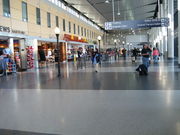
2001 also saw the commencement of the Terminal Improvement Project to expand Terminal A with a new concourse, construct a new International Arrivals Building, and centralize passenger screening. The airport expansion was part of a larger project to enhance the reputation of the Hartford metropolitan area as a destination for business and vacation travel. The new East Concourse opened in September 2002, and the new International Arrivals Building opened in December 2002.[5]
On October 2–3, 2007, the Airbus A380 visited Bradley as part of its world tour, stopping in Hartford to showcase the aircraft to Connecticut workers for Pratt and Whitney and Hamilton Sundstrand, both divisions of United Technologies, who helped build the GP7000 TurboFan engines, which is an option to power the aircraft. Bradley Airport is one of only 68 airports worldwide large enough to accommodate the A380.
On October 18, 2007, Bradley International Airport was named as one of the top five small airports in the North American Airport Satisfaction Study by J.D. Powers.
On October 7, 2008, Embraer, an aerospace company based in Brazil, selected Bradley as its future Northeast service center in the United States. An $11 million project is in place with support from teams of the Connecticut Department of Transportation and Connecticut's Economic and Community Development. Embraer will build and operate a full maintenance and repair facility for its line of business jets, employing up to 60 highly skilled aircraft technicians over the next five years. The opening ceremony for the new facility was October 7, 2008.[7]
On June 23, 2009, Bradley reopened runway 6/24 after reconstructing the runway. The runway originally closed on April 13, 2009, and reconstruction began on April 14, 2009.
On July 16, 2009, Bradley International Airport Celebrated the Grand Opening of the Black Bear Saloon, a new full-service restaurant in Terminal A just past security.[8]
On April 17, 2010, JetBlue Airways announced nonstop service from Fort Lauderdale and Orlando beginning on November 17, 2010.[9]
Passenger, cargo, and military operations
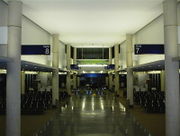
Airlines and destinations
Bradley International Airport consists of two terminals. Terminal A has two concourses: The East Concourse (gates 1-12) hosts Continental Airlines, Delta Air Lines, JetBlue Airways, and Southwest Airlines. The West Concourse (gates 20-30) hosts, Air Canada, American Airlines, United Airlines and US Airways. Currently gates A5, A7, and A20 are unassigned and open for growth. Terminal B was closed on April 15, 2010. Terminal B continues to host the Bradley offices of the Connecticut State Police and is used for storage. Bradley's Master Plan calls for the eventual demolition of Terminal B, and its replacement with a new 24-gate terminal, consisting of two 12 gate concourses.[10]
All international arrivals (except flights with customs preclearance) are handled at the International Arrivals Building, located to the west of Terminal B.
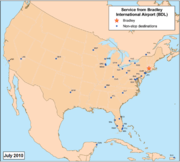
| Airlines | Destinations | Gates |
|---|---|---|
| Air Canada operated by Air Georgian | Montreal-Trudeau, Toronto-Pearson | A22 |
| Air Canada Jazz | Toronto-Pearson | A22 |
| American Airlines | Dallas/Fort Worth, Miami, San Juan | A24-A26 |
| American Eagle | Chicago-O'Hare | A24-A26 |
| Continental Connection operated by CommutAir | Newark | A1, A3 |
| Continental Express operated by Chautauqua Airlines | Cleveland | A1, A3 |
| Continental Express operated by ExpressJet | Cleveland, Newark [seasonal] | A1, A3 |
| Delta Air Lines | All Year: Atlanta, Detroit, Las Vegas [begins September 10], Los Angeles [ends September 30], Minneapolis/St.Paul, Orlando, Tampa, West Palm Beach Seasonal: Cancún, Fort Lauderdale, Fort Myers |
A9-A12 |
| Delta Connection operated by Atlantic Southeast Airlines | Cincinnati/Northern Kentucky, Washington-Reagan [begins October 31] | A9-A12 |
| Delta Connection operated by Chautauqua Airlines | Cincinnati/Northern Kentucky, Detroit, New York-JFK | A9-A12 |
| Delta Connection operated by Comair | Cincinnati/Northern Kentucky, Washington-Reagan [begins October 31] | A9-A12 |
| Delta Connection operated by Compass Airlines | Minneapolis/St. Paul, Raleigh/Durham [begins November 1] | A9-12 |
| Delta Connection operated by Mesaba Airlines | Detroit, Minneapolis/St. Paul | A9-A12 |
| Delta Connection operated by Pinnacle Airlines | Cincinnati/Northern Kentucky, Detroit, New York-JFK, Raleigh/Durham [begins November 1] | A9-A12 |
| Frontier Airlines operated by Chautauqua Airlines | Milwaukee [begins September 27][11] | TBD |
| JetBlue Airways | Fort Lauderdale [begins November 17], Orlando [begins November 17] | A8[12] |
| Southwest Airlines | Baltimore, Chicago-Midway, Denver, Fort Lauderdale [begins November 7], Las Vegas, Nashville, Orlando, Tampa | A2, A4, A6 |
| United Airlines | Chicago-O'Hare, Washington-Dulles | A21, A23 |
| United Express operated by Atlantic Southeast Airlines | Washington-Dulles | A21, A23 |
| United Express operated by Mesa Airlines | Chicago-O'Hare, Washington-Dulles | A21, A23 |
| US Airways | Charlotte, Philadelphia, Washington-Reagan | A27-A30 |
| US Airways Express operated by Air Wisconsin | Philadelphia, Washington-Reagan | A27-A30 |
| US Airways Express operated by Colgan Air | Rochester [ends October 1] | A27-A30 |
| US Airways Express operated by Piedmont Airlines | New York-LaGuardia [begins October 31] | A27-A30 |
| US Airways Express operated by Republic Airlines | Charlotte, Philadelphia, Washington-Reagan | A27-A30 |
| US Airways Express operated by Trans States Airlines | Pittsburgh | A27-A30 |
Cargo operations
| Airlines | Destinations |
|---|---|
| Capital Cargo International Airlines | Rochester |
| FedEx Express | Harrisburg [seasonal], Indianapolis, Manchester (NH) [seasonal], Memphis, Newark, Greensboro [seasonal] |
| FedEx Feeder operated by Wiggins Airways | Bridgeport, Long Island/Islip, Newark, Manchester (NH), Portland (ME) |
| Polet Airlines | Europe |
| UPS Airlines UPS Sorting Hub | Albany, Chicago-Rockford, Dallas/Ft. Worth[seasonal], Des Moines [seasonal],Louisville, Newark, Ontario, CA [seasonal], Philadelphia, Providence, |
| Volga-Dnepr Airlines | Europe |
Military operations
- Connecticut Air National Guard
- 103d Airlift Wing (103 AW) "Flying Yankees"
- 118th Airlift Squadron (118 AS): operates the C-21. The squadron was previously designated as the 118th Fighter Squadron and operated the Fairchild A-10 Thunderbolt II close air support aircraft from the mid 1970's to 2007.
- 103d Airlift Wing (103 AW) "Flying Yankees"
- Military air transports that are commonly seen include the KC-135 Stratotanker, C-17 Globemaster, and the C-130 Hercules.
- Connecticut Army National Guard
- 126th Aviation Regiment
Future
Airport construction
- Airport officials are continuing their efforts towards completing the airport's master plan, which includes demolishing the Murphy Terminal, Terminal B, and replacing it with an entirely new terminal. The new terminal will have a state of the art food court and other retail options for passengers. It will be double the current terminal's size and be broken up into two separate concourses with 24 passenger gates in total (12 in each). It is also slated to contain international arrivals capabilities with customs and immigration services. It is unsure whether the current international arrivals building will be included in the design, as such would depend on international air travel demand. A new parking garage is also planned. These plans will come to fruition after the full completion of Terminal A, which includes renovating the United check-in areas and adding more concessions. Terminal A is expected to be completed by summer of 2010, while Terminal B is not expected to be completed now until 2014 or later.
- The Sheraton Hotel, located between terminals A and B, is also undergoing extensive renovations.
New service
- Delta Air Lines has recently announced three new nonstop destinations from Bradley. Friday only nonstop service to Las Vegas, NV will begin on September 10, 2010[13]; daily nonstop service to Washington-Reagan National will begin on October 31, 2010[14]; and daily nonstop service to Raleigh/Durham, NC will begin on November 1, 2010[15]. Service to Washington-Reagan National and Raleigh/Durham will be operated by Delta Connection carriers. Delta has also indicated that they will consider restarting nonstop service to Los Angeles, CA (which ends September 30) when they reevaluate their scheduling in November 2010[16].
- JetBlue Airways has announced twice daily service to each Fort Lauderdale, FL and Orlando, FL beginning on November 17, 2010. They will look to expand service to Bradley in the future.[9]
- Frontier Airlines has announced twice daily service their Milwaukee, WI hub beginning September 27, 2010. Until 2008, this route was served by Midwest Airlines, which is being merged into Frontier.[11]
- US Airways has announced three daily flights between Hartford and New York City's LaGuardia airport on US Airways Express (operated by Piedmont Airlines), service is set to begin on October 31, 2010.[17]
- Virgin America has named Hartford as a possible future destination from their San Francisco, CA and/or Los Angeles, CA hubs.[18]
International Arrivals Building
In December 2002, a new International Arrivals Building opened to the west of Terminal B.[5] This new International Arrivals Building houses the Federal Inspection Station and has one jetway for deboarding the aircraft. The IAB replaced the old FIS in Terminal B and will be enlarged as volume demands.[19] Two government agencies provide crucial support at the facility, these agencies are: U.S. Customs and Border Protection, and the U.S. Department of Agriculture. The FIS Terminal (International Arrivals Building) is a two-story, 28,000-square-foot (2,600 m2) facility adjacent to Terminal B and the recently constructed Remote Deicing Collection Facility. This entire Construction project included the FIS Terminal and associated landside and airside improvements; entrance roadway, sidewalks and concrete hardstand for arriving aircraft parking. The FIS Terminal can process more than 300 passengers per hour from aircraft as large as a Boeing 747. International departures will be handled from the existing terminal complex. This facility cost approximately $7.7 million, which included the building and site work. A unique, 9’ x 20’ American flag tile mosaic was donated by Robert LaRosa, president of LaRosa Building Group, which designed and constructed the facility. The mosaic is visible upon entering the front of the building. This project was funded through the Bradley Improvement Fund.[20]
All international arrivals except for those from airports with customs preclearance are processed through the IAB.
Ground transportation
Rail
The closest train stations are Windsor Locks and Windsor, both serviced by Amtrak.[21] Connecticut Transit buses travel between the Windsor train station and the airport. The state of Connecticut has planned for commuter rail between New Haven and Springfield, and increased bus service, if not a complete rail link, has been discussed for the airport.
Bus
Connecticut Transit route 34 provides local service connecting Bradley with Windsor and Hartford. Route 30 (the "Bradley Flyer") provides express service to downtown Hartford.[22]
Environment
The Connecticut Air National Guard 103d Airlift Wing leases 144 acres in the southwest corner of the airport for their Bradley ANG Base. The base is currently being assessed to determine if it should be placed on the National Priorities List and designated as a Superfund site.[23]
Bradley has also been identified as one of the last remaining tracts of grassland in Connecticut suitable for a few endangered species of birds, including the Upland Sandpiper, the Horned Lark, and the Grasshopper Sparrow.[24]
Incidents and accidents
- May 3, 1991
- A Ryan International (wet-leased by Emery Worldwide) Boeing 727-100QC N425EX, catches fire during take-off. The take-off is aborted and the 3 crew members escapes, while the aircraft is destroyed by the fire. The fire was determined to have started in the number 3 engine. It was determined that the 9th stage HP compressor had ruptured.[25]
- November 12, 1995 at 12:55am EST
- An American Airlines MD-83 N566AA, crashed while trying to land at Bradley. American Airlines flight 1572, was substantially damaged when it impacted trees while on approach to runway 15 at Bradley International Airport. The airplane also impacted an instrument landing system antenna as it landed short of the runway on grassy, even terrain. The cause of the accident was determined to be the pilot's failure to reset the altimeter,[26] however, severe weather may have played a factor. 9 of the 78 passengers were injured.
- January 21, 1998
- A Continental Express ATR-42 N15827 had an emergency during roll on landing. During the landing roll, a fire erupted in the right engine. The airplane was stopped on the runway, the engines were shut down, and the occupants evacuated. The fire handles for both engines were pulled and both fire bottles on the right engine discharged. However, the fire on the right engine continued to burn. The airport fire services attended shortly afterward and extinguished the fire.
- January 6, 2003
- An Embraer ERJ-145LR Continental Express overan the runway at Cleveland Hopkins Airport after leaving Bradley. After touchdown, the flight crew was unable to stop the airplane on the runway. The airplane continued beyond the departure end, on extended runway centerline, and struck the ILS runway 6 localizer antenna. It came to rest with the nose about 600 feet beyond the end of the runway. The nose landing gear had collapsed rearward and deformed the forward pressure bulkhead.
- April 1, 2004 at 6:30pm EST
- A Beechcraft 1900D operating as US Airways Express/Colgan Air N149CJ hit a fuel truck while parking. The Beech 1900D landed on runway 24, and was cleared to taxi to the ramp. As the airplane entered the ramp area, the flight crew planned to stop beyond the hold-short line, to wait for another airplane to exit gate 25. As the flight crew crossed the hold-short line, and were almost at a complete stop, they felt a "buffet," which became a "large jolt," on the left side of the fuselage. After realizing a fuel truck impacted the left engine and propeller, the captain shut down the engines, and evacuated all 14 passengers from the right window emergency exit. No one was injured. A leading factor was that it was night and the Fuel truck driver neglected to maintain clearance with the taxiing plane.[27]
- June 22, 2010 at 8:20pm EST
- A Virgin Atlantic aircraft was diverted to Bradley International after showers and string thunderstorms picked up in the North East. The flight was an international flight coming from the UK bound for Newark Liberty International Airport. The plane was forced to stay on the tarmac away from the terminal until customs arrived. Soon after arriving at the tarmac, the AirConditioning started experiencing technical difficulties. The plane had close to 300 people on board. After the customs officials finished checking all the baggage and people on the plane, the passengers were finally allowed to deboard into the terminal. The airline offered passengers vouchers for ground transportation, hotels, and food.[28]
See also
- Connecticut World War II Army Airfields
- Hartford-Brainard Airport (HFD)
- Tweed New Haven Airport (HVN)
- Westover Metropolitan Airport (CEF)
- Previously marketed by defunct Skybus Airlines as "Hartford (Chicopee, MA)".
- Yankee Terminal Radar Approach Control (Y90)
References
![]() This article incorporates public domain material from websites or documents of the Air Force Historical Research Agency.
This article incorporates public domain material from websites or documents of the Air Force Historical Research Agency.
- ↑ FAA Airport Master Record for BDL (Form 5010 PDF), effective 2007-07-05
- ↑ Bradley International Airport - Courant.com
- ↑ http://www.bradleyairport.com/News/press.aspx?id=102
- ↑ "FAA 2008 Passenger Boarding Statistics". http://www.faa.gov/airports/planning_capacity/passenger_allcargo_stats/passenger/media/cy08_primary_np_comm.pdf. Retrieved 2010-02-11.
- ↑ 5.0 5.1 5.2 5.3 5.4 5.5 5.6 5.7 http://www.bradleyairport.com/News/factsheet.aspx
- ↑ http://articles.courant.com/2010-04-02/business/hc-bradley-terminal.artapr02_1_million-terminal-improvement-project-airport-cleaning-crews-terminal-s-construction
- ↑ [1]
- ↑ [2]
- ↑ 9.0 9.1 http://www.bradleyairport.com/News/press.aspx?id=121
- ↑ "2009 Strategic Plan". http://bradleyairport.com/docs/StrategicPlan2009.doc. Retrieved 2010-02-11.
- ↑ 11.0 11.1 http://finance.yahoo.com/news/Frontier-Airlines-Makes-bw-4059351940.html?x=0&.v=1
- ↑ BDL staff; see the Discussion page
- ↑ http://www.bradleyairport.com/News/press.aspx?id=125
- ↑ http://news.delta.com/index.php?s=18&item=136
- ↑ http://triangle.bizjournals.com/triangle/stories/2010/08/23/daily30.html
- ↑ http://www.courant.com/business/hc-delta-end-bradley-los-angles-route20100726,0,5684449.story
- ↑ http://www.usairways.com/en-US/aboutus/pressroom/pressreleases.html
- ↑ http://www.travelindustrywire.com/article26046-Virgin_America_Identifies_First_Six_Destinations__Announces_Further____Cities_Under_Consideration.html
- ↑ Bradley Airport Master Plan (not available online)
- ↑ http://www.bradleyairport.com/pdfs/Fact_Sheet_FIS.pdf
- ↑ Amtrak - Station Search Results
- ↑ "CTTransit Routes & Schedules". http://www.cttransit.com/RoutesSchedules/SystemMapDisplay.asp. Retrieved 2010-02-11.
- ↑ "Connecticut Air National Guard Bradley Base - Site awaiting NPL decision". http://yosemite.epa.gov/R1/npl_pad.nsf/31c4fec03a0762d285256bb80076489c/297184816995ce7585256b420060574a!OpenDocument. Retrieved 2010-01-09.
- ↑ "Audubon Connecticut, Protecting Connecticut's Grassland Heritage". http://www.audubonct.org/PDFs/CT_GrasslandHeritage.pdf. Retrieved 2010-02-11.
- ↑ http://aviation-safety.net/database/record.php?id=19910503-0
- ↑ http://aviation-safety.net/database/record.php?id=19951112-0
- ↑ http://aviation-safety.net/database/record.php?id=20040401-0
- ↑ http://news.yahoo.com/s/ap/us_stranded_on_plane
External links
- Bradley International Airport (official site)
- Airport area development
- Images of Concourse Artwork
- TAC Air - Building 85-205 (Executive Terminal)
- Signature Flight Support - on BDL property but physical address is 100 Signature Way East Granby, Connecticut 06026
- FAA Airport Diagram (PDF), effective 23 Sep 2010
- FAA Terminal Procedures for BDL, effective 23 Sep 2010
- Resources for this airport:
- AirNav airport information for KBDL
- ASN accident history for BDL
- FlightAware airport information and live flight tracker
- NOAA/NWS latest weather observations
- SkyVector aeronautical chart for KBDL
- FAA current BDL delay information
|
|||||||||||||||||||||||||||||||||||||||
